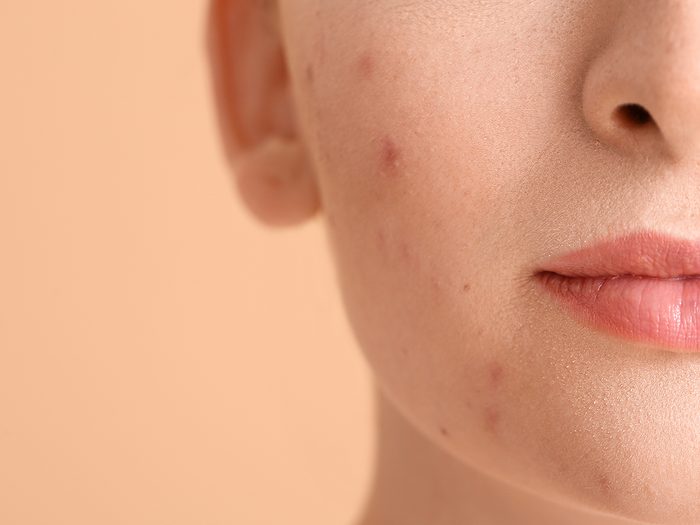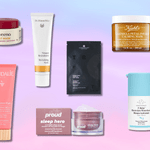Can This TikTok-Famous Supplement Really Treat Acne?

Some content creators swear DIM supplements cleared their skin—here’s what experts say.
On the hunt for a new acne treatment? You may have come across one that’s all over the TikTok scene. Content creators claim that a supplement called DIM, shorthand for diindolylmethane, reduces hormonal acne by balancing estrogen and testosterone levels. In one TikTok video with over 90,000 saves, creator @maviiii.29 says she had tried a slew of acne treatments—from salicylic acid to tretinoin—to address her severe breakouts, but only DIM was able to deliver “crazy, crazy results,” she said, clearing her skin in just one week.
So, what is DIM exactly and where does it come from? You body, actually. When you eat cruciferous vegetables like broccoli, kale and cabbage, natural chemicals in those vegetables form a compound called Indole-3-Carbinol. During digestion, your stomach acid breaks that compound down and creates DIM.
But DIM can also come in supplement form—which is how TikTokers are getting their supply. DIM supplements were approved by Health Canada back in 2015, but despite being on health store shelves for nearly a decade, there still isn’t a lot of reliable information on how it can affect the skin.
We talked to registered dietitian Maude Morin, as well as dermatologist and adjunct professor at the University of Western Ontario Jerry Tan, to find out if DIM can actually help alleviate acne.
(Related: Can the Facial Massages on TikTok Really Change Your Face?)
People say DIM supplements help alleviate acne—is that actually possible?
Tan, whose clinical research focuses on acne and rosacea, says there are two potential hypotheses for the effect that DIM has on acne.
There’s a specific acne-causing bacteria, called cutibacterium, that can generate a slime-like layer on skin called biofilm, says Tan. The biofilm allows the bacteria to grow while also preventing acne treatments from fighting it off. But a 2022 study published in Microbiology Spectrum showed DIM can inhibit both the growth of cutibacterium acne and the formation of biofilm, which may be why DIM is reducing some people’s acne.
The other hypothesis, which is the one making its way around skin care Tiktok, is that DIM regulates hormones. When androgens (produced by the testicles, ovaries, and adrenal glands) bind to receptors in the skin’s oil glands, they trigger an increase in oil, which can become inflammatory and cause acne. The idea is that DIM may block these receptors, thereby decreasing oil production and reducing acne. This has not been proven through research, but a 2010 study suggests DIM stimulates estrogen, which could explain its effect on acne since estrogen reduces androgens, and could therefore decrease oil production and lessen acne. (That’s the reason birth control pills containing estrogen have an effect on acne.)
But again, both Tan and Morin agree there isn’t enough research on DIM supplements and human skin to definitively explain the effect the supplement might have on acne.
(Related: Could Psychodermatology Be the Key to Healthier Skin?)
Is a DIM supplement safe?
The supplement may come with some risks. The recommended dose ranges from 50 to 300 milligrams, and how much you take really matters. Tan says every dose can affect the body differently, and certain doses could come with serious risks. One experimental study found that a 10 micromole per litre concentration of DIM (a low concentration that you can obtain from food or supplements) can stimulate proliferation of breast cancer cells. Given potential side effects like this, it’s best to contact your doctor before taking any supplements.
Morin suggests instead looking to whole food sources of the compound. Eat two servings (about two cups) of cruciferous vegetables a day for a month, and see if your acne has improved. But note: Eating too many cruciferous vegetables can cause bloating and gas. If that happens, Morin recommends eating them cooked, dividing your servings among several meals, or reducing your intake.
What else can I try to cure my acne?
Morin encourages her clients to focus on one intervention at a time so you know which one is the acne-fighting hero. She uses supplements as a second-phase treatment. The first phase includes making sure you get enough sleep (it’s an “amazing hormone regulator,” she says), editing your diet (by drinking enough water, eating more antioxidant-rich fruits and vegetables, and keeping blood sugar levels balanced) and learning ways to manage stress (like meditation or social connection).
If you’re set on exploring the supplement realm to alleviate acne, you must consult your family doctor or dermatologist. Morin advises seeking a referral to a dermatologist who can order blood work to reveal if you have a hormonal imbalance that’s causing acne. If so, it can be easily treated by a common medication, such as spironolactone or birth control pills.
And remember: The best treatment for you is the one recommended for you by an expert—not plucked from someone’s TikTok video. So before listening to a content creator shucking supplements with no expertise, stop scrolling, and book an appointment with your doctor.
Next: What to Know About Azelaic Acid, the New Buzzy Acne-Crushing Ingredient




